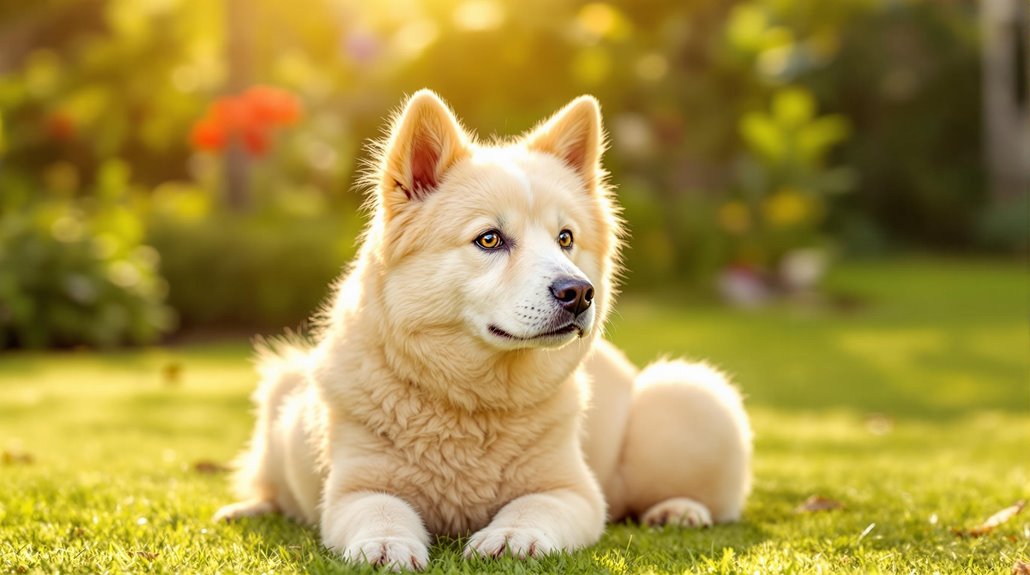Aki-Poos stand out among Akita-Poodle mixes due to their distinctive blend of traits from both parent breeds. You'll find they combine the Akita's protective instincts with the Poodle's intelligence in unique ways, creating a versatile companion that's both watchful and trainable. Their physical appearance varies widely, from 45 to 120 pounds, with coat types ranging from straight to curly in multiple colors. They're known for their hybrid vigor, which can lead to better health outcomes compared to purebreds. While they require consistent grooming and exercise, their adaptable nature makes them suitable for different living situations. There's much more to discover about these remarkable designer dogs.
Historical Origins and Breed Development
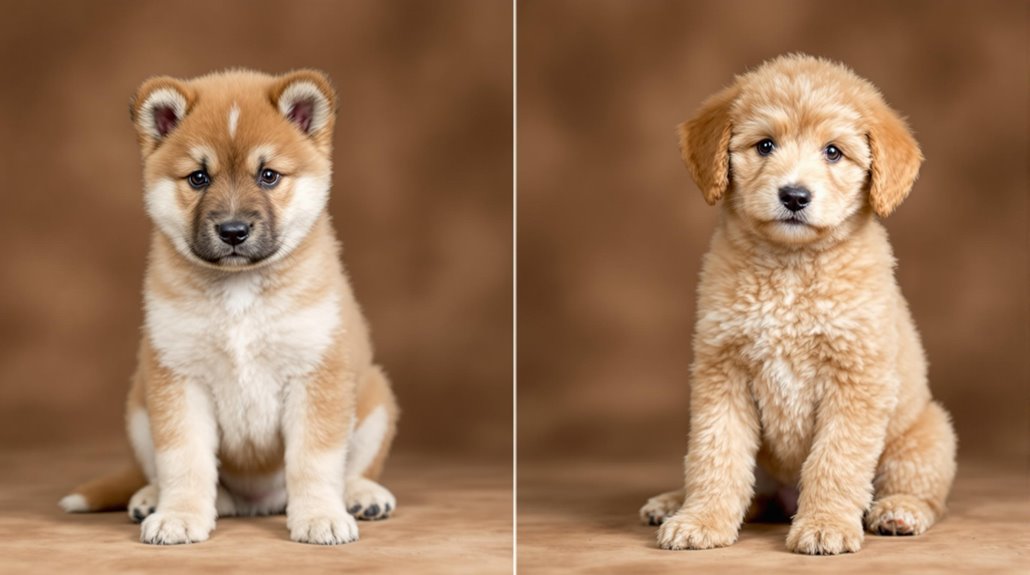
The fusion of two distinct dog breeds led to the creation of the Aki-Poo, a designer hybrid that emerged in the United States during the late 20th century. This unique mix combines the noble Akita, Japan's national treasure, with the intelligent Standard Poodle, originally bred as a water retriever in France.
Unlike purebred dogs that follow strict breeding standards, you'll find that Aki-Poos display diverse characteristics due to their hybrid nature. Since major kennel clubs don't recognize this mixed breed, breeders have more flexibility in developing the Aki-Poo's traits.
The development of this hybrid breed coincided with the rising popularity of designer dogs, offering:
- Greater genetic diversity through multi-generational breeding
- Potential health benefits from hybrid vigor
- A blend of physical and temperamental traits from both parent breeds
You should know that while each Aki-Poo is unique, they consistently reflect aspects of both their Akita and Poodle heritage. The breed's development continues to evolve as breeders work to establish more predictable traits through careful selection and multi-generational breeding programs.
Physical Traits and Appearance
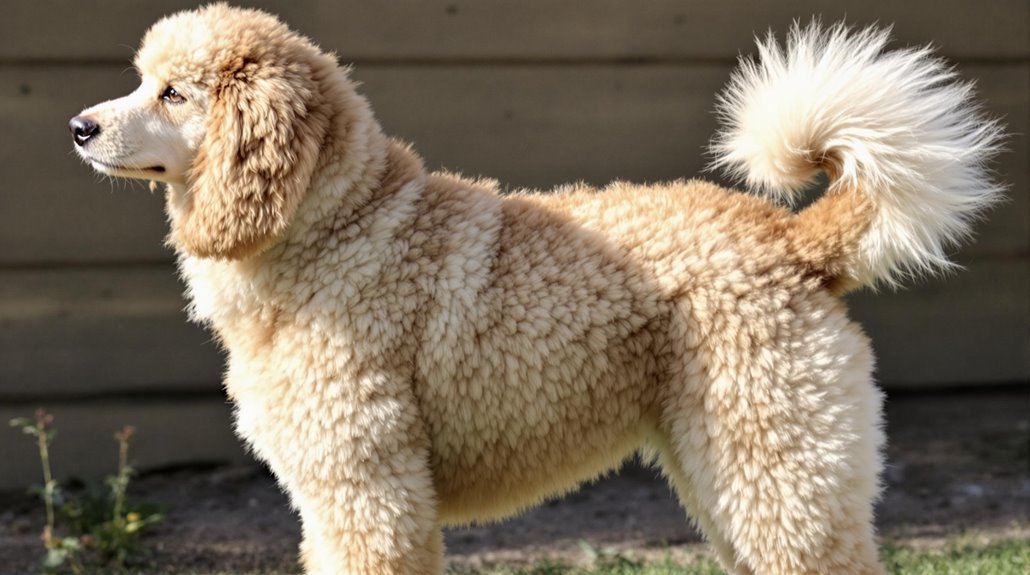
While their breeding history shapes their genetic makeup, an Aki-Poo's physical appearance can vary considerably from one dog to another. You'll find these unique dogs standing between 15-28 inches tall and weighing anywhere from 45-120 pounds, making them adaptable to different living situations.
When you're looking at an Aki-Poo's physical traits, you'll notice their coat type can range from straight to curly, reflecting their mixed heritage. You'll see colors including black, brown, red, fawn, and white, giving you plenty of variety in appearance. Their ears might be floppy like a Poodle's or stand erect like an Akita's, adding to their distinctive charm.
You'll want to pay attention to their grooming needs, which will depend on their specific coat inheritance. Some Aki-Poos have the low-shedding coat that's more Poodle-like, while others may take after their Akita parent. Their build typically combines the Poodle's elegant features with the Akita's sturdy frame, and you'll often notice a curly, fluffy tail that showcases their mixed breeding.
Temperament and Behavioral Characteristics
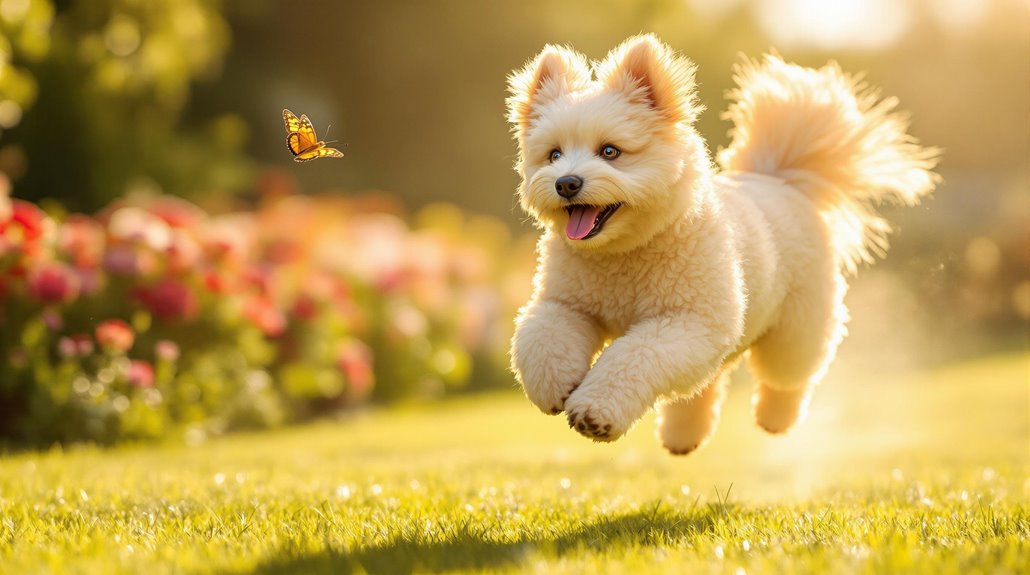
Loyal and affectionate Aki-Poos bring together the best personality traits from both parent breeds, combining a Poodle's playfulness with an Akita's protective nature.
Key Behavioral Traits:
- Intelligence: You'll find these dogs quick to learn and responsive to training, though they may occasionally display stubborn tendencies
- Social Nature: While naturally protective, your Aki-Poo will need early socialization to become comfortable with strangers
- Family Dynamics: Their playful temperament makes them excellent companions for families, often displaying entertaining, clown-like behavior
Training Considerations:
- Use positive reinforcement consistently to manage potential stubbornness
- Establish clear boundaries early to channel their protective instincts appropriately
- Maintain regular training sessions to keep their intelligent minds engaged
Individual Personality Variations:
- Each Aki-Poo's behavioral characteristics can vary due to their hybrid nature
- Some may lean more toward the Poodle's enthusiasm to please
- Others might display more of the Akita's independent streak
You'll need to adapt your training approach based on your dog's specific personality traits, remembering that consistency and patience are key to success with this intelligent breed.
Health Considerations and Genetic Advantages
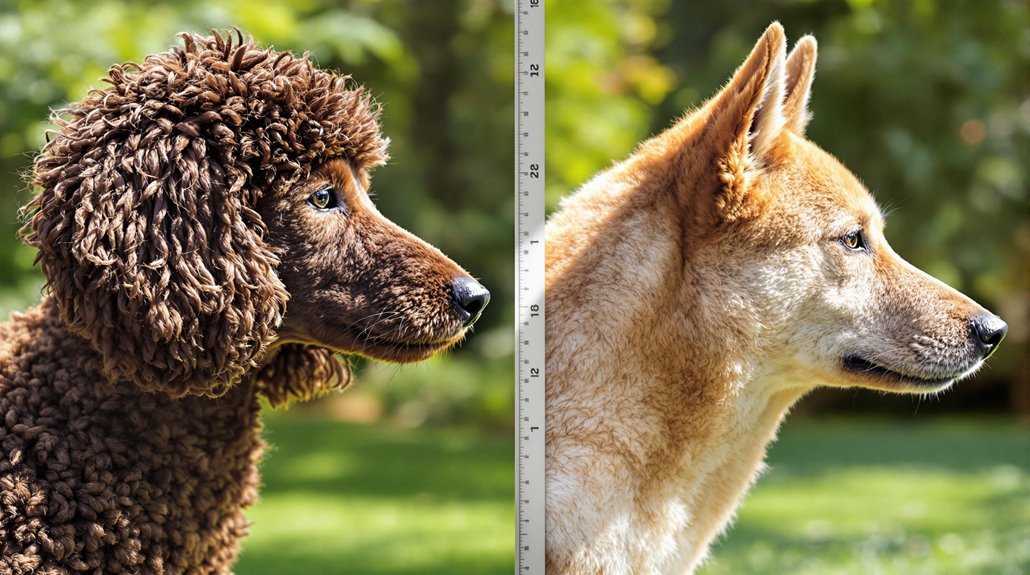
Understanding your Aki-Poo's health profile is as important as mastering their training needs. While these mixed-breed dogs can inherit health issues from both parent breeds, they benefit greatly from hybrid vigor, which often results in better overall health compared to purebred dogs.
Key Health Considerations:
- Hip and elbow dysplasia monitoring through regular health screenings
- Bloat prevention through proper feeding schedules
- Autoimmune disease awareness and early detection
- Regular veterinary check-ups to maintain peak health
Your Aki-Poo's mixed genetic background can work to their advantage, as they're less likely to develop certain breed-specific conditions that affect purebred Akitas and Poodles. With proper care, you can expect your companion to live 12-15 years, which is a healthy lifespan for dogs of their size.
To guarantee your Aki-Poo thrives:
- Schedule routine veterinary visits
- Monitor for signs of joint problems
- Maintain a healthy diet and exercise routine
- Keep detailed health records
- Stay informed about both parent breeds' health histories
Training Requirements and Intelligence Levels
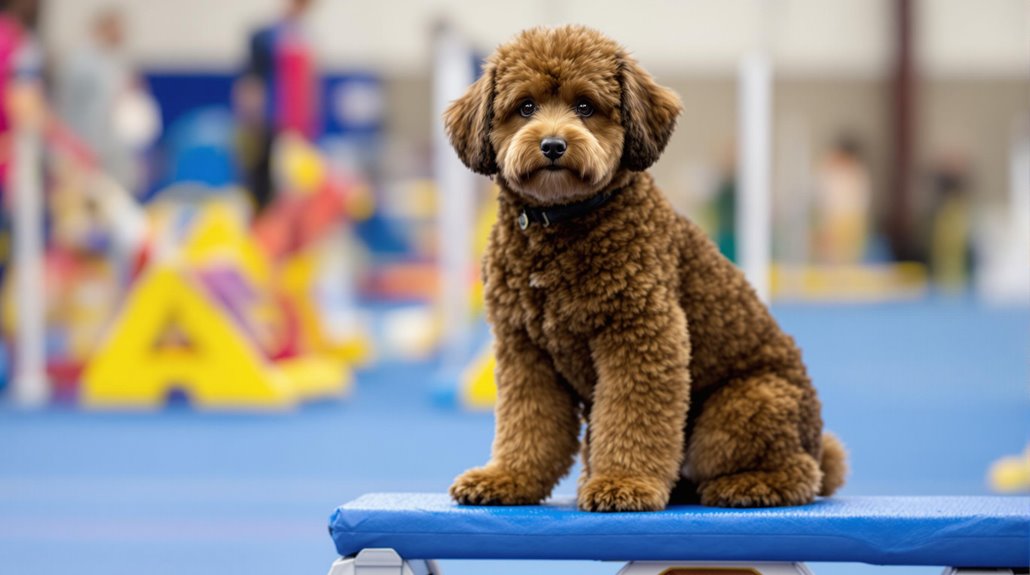
The exceptional intelligence of Aki-Poos sets them apart in the world of designer breeds, thanks to their Poodle parentage and the quick-thinking nature of Akitas.
You'll need to commit to proper training and socialization from an early age to harness your Aki-Poo's highly intelligent nature effectively. Starting between 8-12 weeks, you should expose your puppy to various environments and people to develop well-rounded social skills.
Key Training Requirements:
- Daily training sessions using positive reinforcement
- At least one hour of combined physical and mental exercise
- Interactive games and puzzle toys to prevent boredom
- Consistent command practice to manage stubborn tendencies
Remember that these dogs thrive on mental challenges, and you'll need to provide regular stimulation to prevent unwanted behaviors. Without adequate engagement, your Aki-Poo may channel their intelligence into destructive activities. You can maximize their potential through:
- Structured training routines
- Regular socialization opportunities
- Problem-solving activities
- Varied exercise programs
Exercise Needs and Energy Management
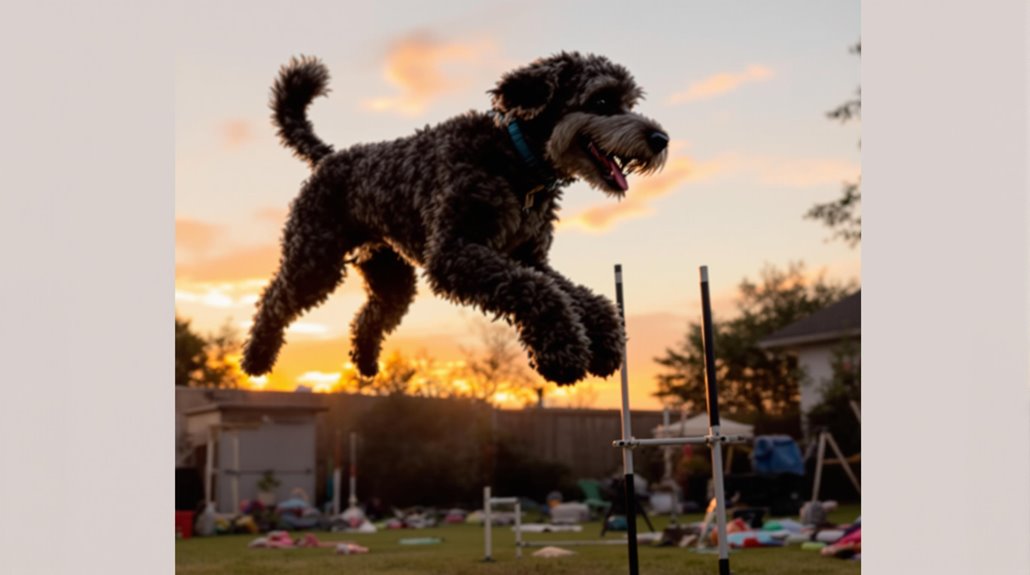
Managing an Aki-Poo's abundant energy requires a well-structured exercise routine that combines physical activity with mental stimulation. You'll need to dedicate at least one hour daily to meet your dog's exercise needs through various activities that keep them engaged and healthy.
To effectively manage your Aki-Poo's energy levels, incorporate these significant activities:
- Daily walks or jogs to provide both exercise and environmental exploration
- Interactive games like fetch and tug-of-war for physical and mental engagement
- Swimming sessions when possible, offering low-impact cardiovascular exercise
- Playtime with toys that challenge their problem-solving abilities
You'll find that consistent exercise does more than just tire out your Aki-Poo – it's vital for their overall well-being. Without proper activity, these intelligent dogs may develop unwanted behaviors due to boredom and pent-up energy. By maintaining a regular exercise schedule, you're helping to:
- Prevent destructive behaviors
- Support healthy weight management
- Reduce the risk of joint problems
- Enhance socialization opportunities
- Strengthen your bond through shared activities
Remember to adjust the intensity of activities based on your dog's age and fitness level while ensuring they receive adequate mental stimulation throughout the day.
Grooming Demands and Coat Types
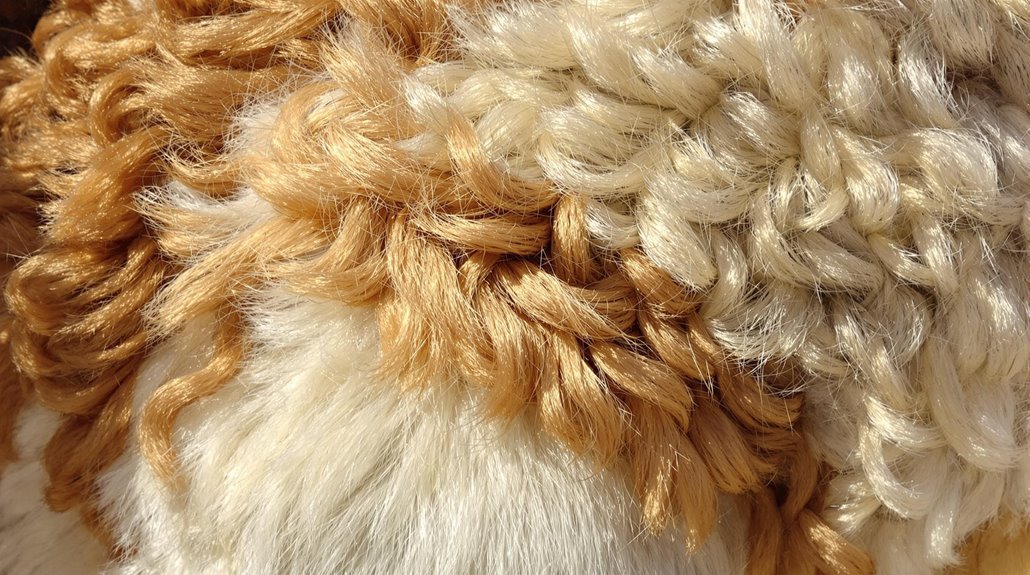
When it comes to coat care, Aki-Poos present unique grooming challenges due to their diverse genetic inheritance from Akitas and Poodles. You'll find their coats can range from straight to curly, which means you'll need to adjust your grooming routine accordingly.
If your Aki-Poo has inherited a curlier coat type, you'll want to establish a more frequent brushing schedule of 2-3 times per week to prevent matting. Regular grooming isn't just about maintaining their appearance—it's vital for their overall health and comfort. You'll need to pay special attention to their ears during grooming sessions, as proper inspection and cleaning help prevent potential health issues.
Understanding your Aki-Poo's specific coat type is essential for determining the right grooming needs:
- Straight coats typically require less maintenance but may shed more
- Curly coats need more frequent brushing and professional grooming
- Mixed coat types fall somewhere in between, requiring moderate maintenance
Remember that your Aki-Poo's grooming requirements won't necessarily match those of either parent breed, so you'll need to develop a personalized care routine that suits their unique coat characteristics.
Living Space and Environmental Adaptability
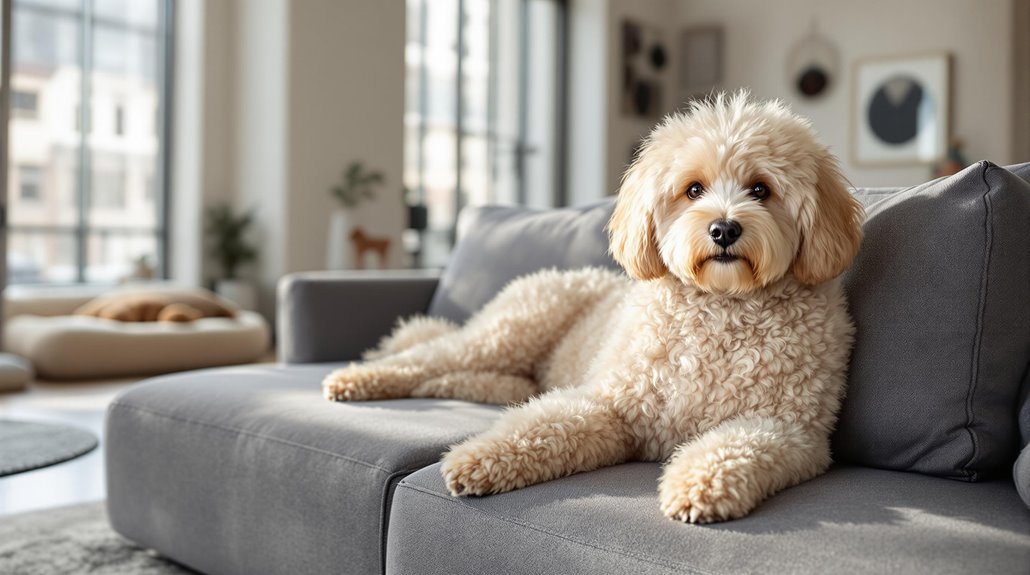
Prospective Aki-Poo owners should evaluate their living situation carefully, as these adaptable dogs can thrive in various environments with proper care. While they're flexible with living space options, you'll need to guarantee your home can accommodate their daily exercise needs of at least one hour of physical activity.
If you're living in an apartment, you'll want to reflect on your proximity to parks or walking trails, as regular outdoor activities are essential for your Aki-Poo's well-being. However, a home with a fenced yard provides the ideal setting where they can run and play freely throughout the day.
Early socialization plays a significant role in helping your Aki-Poo adjust to their environment. You'll need to expose them to different situations, people, and other pets to make sure they develop into well-adjusted companions. Reflect on your neighborhood's noise levels, as some Aki-Poos may be sensitive to excessive sounds.
Remember that regardless of your living space, providing consistent exercise through walks, hikes, or playdates is important. This commitment helps prevent behavioral issues and guarantees your Aki-Poo remains happy and well-adjusted in their environment.
Designer Guard Dog Hybrid
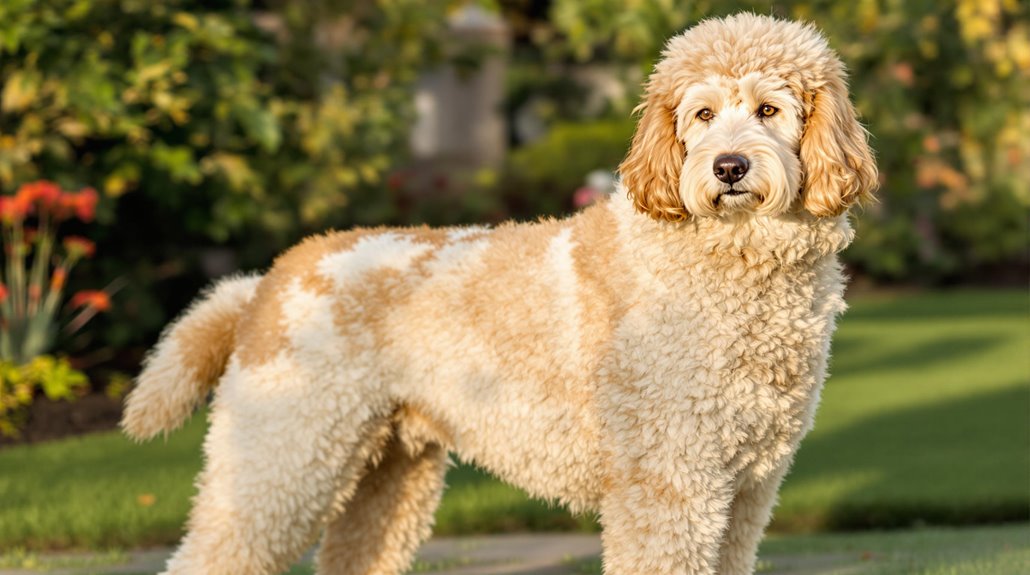
Your Aki-Poo combines the protective instincts of an Akita with the intelligence of a Poodle, creating an alert watchdog that's both vigilant and gentle with family members. You'll find these designer guard dogs excel at monitoring their territory, thanks to their sturdy build of 15-28 inches and keen awareness of their surroundings. Their success as guard dogs varies with their size, but you can count on their loyal nature and protective instincts to help keep your home secure, especially when they receive proper training and socialization.
Protective Yet Gentle Nature
The Aki-Poo's dual nature offers a unique combination of watchdog instincts and family-friendly demeanor. You'll find these intelligent hybrids excel at protecting your home while maintaining a gentle disposition with family members. Their protective instincts come naturally from their Akita parentage, making them reliable guardians of your household.
When you're considering an Aki-Poo, you'll need to prioritize early socialization to help balance their watchdog tendencies. This essential training guarantees they'll develop into well-rounded loving companions who can distinguish between genuine threats and normal daily activities. Your Aki-Poo will learn to interact positively with children and other pets while maintaining their vigilant nature.
Key Protective Yet Gentle Traits:
- Strong bond formation with family members
- Alert and watchful behavior without excessive aggression
- Natural ability to adapt between guardian and companion roles
- Intelligent responses to different situations
- Gentle demeanor with trusted family and friends
Your Aki-Poo's balanced temperament comes from combining the Akita's courage with the Poodle's gentleness. This mix creates a dog that'll protect your home while showing affection and playfulness to those within their trusted circle.
Alert Watch Dog Skills
Building on their protective yet gentle nature, Aki-Poos stand out as remarkable watchdogs in the designer hybrid world. You'll find their inherited traits from both parent breeds create an exceptional alert system for your home and family.
These intelligent hybrids excel at watchdog duties thanks to their unique genetic makeup:
- Their Akita heritage provides natural wariness of strangers and protective instincts
- Poodle intelligence enables quick training response for alert behaviors
- Combined strength and agility make them effective deterrents
You'll need to focus on proper training to maximize your Aki-Poo's watchdog potential:
- Start socialization early to balance alertness with appropriate responses
- Establish clear commands for alert barking versus quiet time
- Reward consistent watchdog behavior while preventing over-protective tendencies
Your Aki-Poo's strong family bond enhances their natural inclination to monitor your surroundings. They'll maintain vigilant watch over your property while distinguishing between genuine threats and routine visitors. Through consistent training, you can develop their innate abilities into reliable watchdog skills that serve your security needs without becoming overly aggressive.
Size Impacts Guard Ability
Standing anywhere from 15 to 28 inches tall and weighing between 45 to 120 pounds, Aki-Poos offer versatile guarding capabilities that directly correlate with their size variations. Their range in size allows you to select a guard dog that's perfectly suited to your specific protection needs and living environment.
You'll find that larger Aki-Poos typically provide a more imposing physical presence, which can effectively deter potential intruders through their size alone. These bigger specimens carry the protective instincts of their Akita parentage while maintaining the Poodle's intelligence, making them excellent watchful companions.
If you're considering a smaller Aki-Poo, don't underestimate their guard dog potential. These more compact versions often excel in:
- Quick movement and agility for property surveillance
- Fitting into tighter spaces for monitoring
- Maintaining a lower profile while still being alert
- Adapting to smaller living spaces while remaining protective
The size variation in Aki-Poos means you can match their physical attributes to your specific guarding requirements. Whether you need a large, intimidating presence or a more nimble guardian, there's likely an Aki-Poo size that'll meet your security needs.
Akita-Standard Poodle Cross
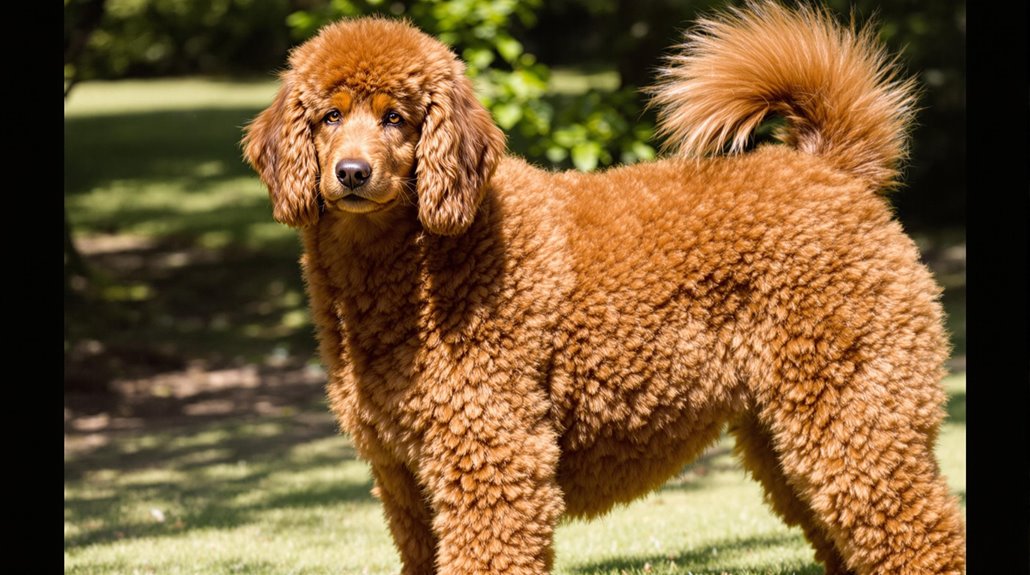
Created through the purposeful crossing of Akitas and Standard Poodles, Aki-Poos blend distinctive characteristics from both parent breeds. You'll find these dogs exhibit a remarkable mix of physical traits, with heights ranging from 15 to 28 inches and weights varying between 45 and 120 pounds.
When you're considering an Aki-Poo, you'll need to prepare for a dog that combines the Poodle's intelligence with the Akita's protective nature. Their coat type can vary considerably, which means you'll need to adapt your grooming routine based on whether your dog inherits more of the Poodle's curly fur or the Akita's straight, dense coat.
Training requirements for your Aki-Poo will be substantial, as you'll need to address both the Standard Poodle's keen-to-please attitude and the Akita's independent streak. You can expect to invest time in early socialization to guarantee your dog develops into a well-adjusted family companion. With proper guidance, you'll find that these dogs excel in both protective roles and family activities, making them versatile additions to homes that can provide consistent leadership and training.
Curly-Coated Alert Expression
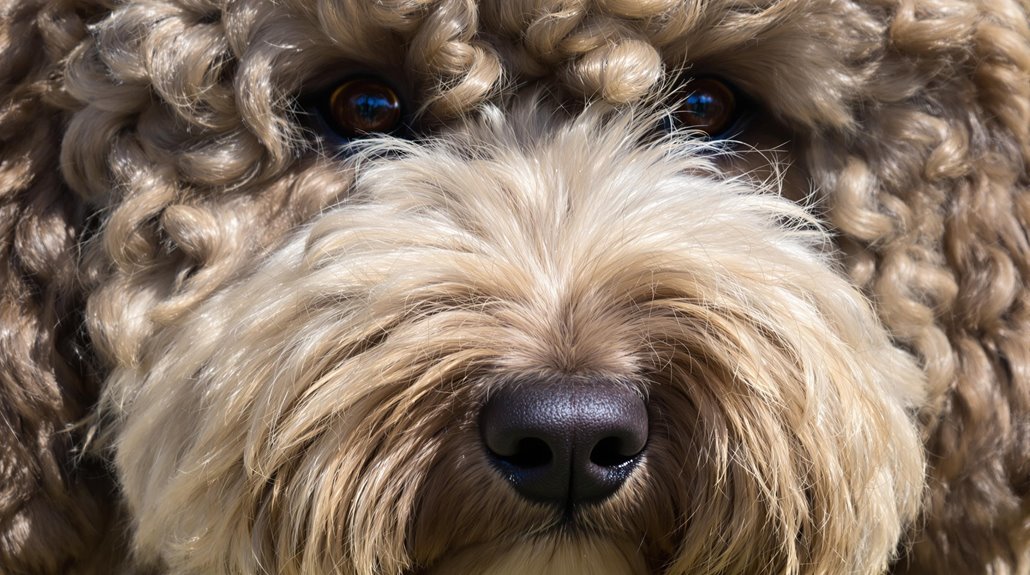
Your Aki-Poo's size can range from 4-27 inches at the shoulder, depending on which Poodle variety was used in breeding. The dense double-layered fur combines the Poodle's signature curls with the Akita's protective undercoat, creating a unique texture that needs regular maintenance. You'll need to brush your Aki-Poo's coat several times per week to prevent matting, especially around the face and neck where the fur tends to be thickest.
4-27 Inches at Shoulder
The Aki-Poo's 7-inch shoulder height represents an unusually petite variation of this designer breed, as most specimens typically range from 15 to 28 inches tall. When you encounter an Aki-Poo of this diminutive size, you'll notice it's quite rare among the Akita and Poodle hybrid breed standards.
Despite their smaller stature, these compact Aki-Poos maintain the distinctive characteristics that make the breed special:
- A balanced physique that combines the Akita's sturdy frame with Poodle elegance
- The same alert, intelligent expression found in larger specimens
- Protective instincts that match their full-sized counterparts
- The signature coat variations, from straight to curly
If you're considering a smaller Aki-Poo as your companion, you should know they'll still display the breed's watchful nature and loyal temperament. Their reduced size doesn't diminish their ability to serve as attentive family guardians. While these miniature versions may be less common, they offer the same blend of both parent breeds' positive traits in a more compact package, making them suitable for homes with limited space.
Dense Double-Layered Fur
Dense double-layered fur defines an Aki-Poo's distinctive appearance, combining the Akita's protective undercoat with the Poodle's signature curls. You'll notice this unique coat offers both insulation and the allergy-friendly benefits that make these dogs suitable for many homes.
When you're considering an Aki-Poo, it's important to understand their grooming requirements. Their dense double coat needs regular grooming to maintain its healthy condition. You'll need to commit to brushing your dog 2-3 times weekly to prevent matting and manage any shedding that occurs.
The coat's texture can vary greatly between dogs, ranging from tightly curled to relatively straight, depending on which parent's genes are more dominant. You'll find these dogs sporting a variety of colors, including:
- Black
- Brown
- Red
- Fawn
- White
One of the most appealing features you'll notice is the hypoallergenic traits inherited from the Poodle parent. This characteristic, combined with their alert, fluffy facial expression, makes them both practical and visually striking companions. The coat's density around their face creates that distinctive, attentive look that Aki-Poo owners have come to love.
Regular Brushing Prevents Matting
Maintaining your Aki-Poo's distinctive coat starts with a consistent brushing routine, particularly for those inheriting curlier fur patterns from their Poodle parent. You'll need to establish a regular brushing schedule of 2-3 times weekly to keep your pet's coat healthy and tangle-free.
To effectively prevent matting, you'll want to invest in the right grooming tools. A slicker brush works well for curly coat textures, while a sturdy comb helps detect and remove any developing tangles before they become problematic. These tools help distribute natural oils throughout your dog's fur, promoting ideal skin health.
Starting your grooming routine early in your Aki-Poo's life will make the process smoother for both of you. Here's what you should focus on:
- Brush thoroughly from root to tip
- Pay special attention to areas prone to matting, such as behind the ears and under legs
- Monitor skin condition during brushing sessions
- Maintain a consistent schedule to prevent fur from becoming unmanageable
Remember that regular brushing isn't just about appearance—it's essential for preventing skin irritation and maintaining your Aki-Poo's overall comfort and health.
Loyal Yet Independent Spirit
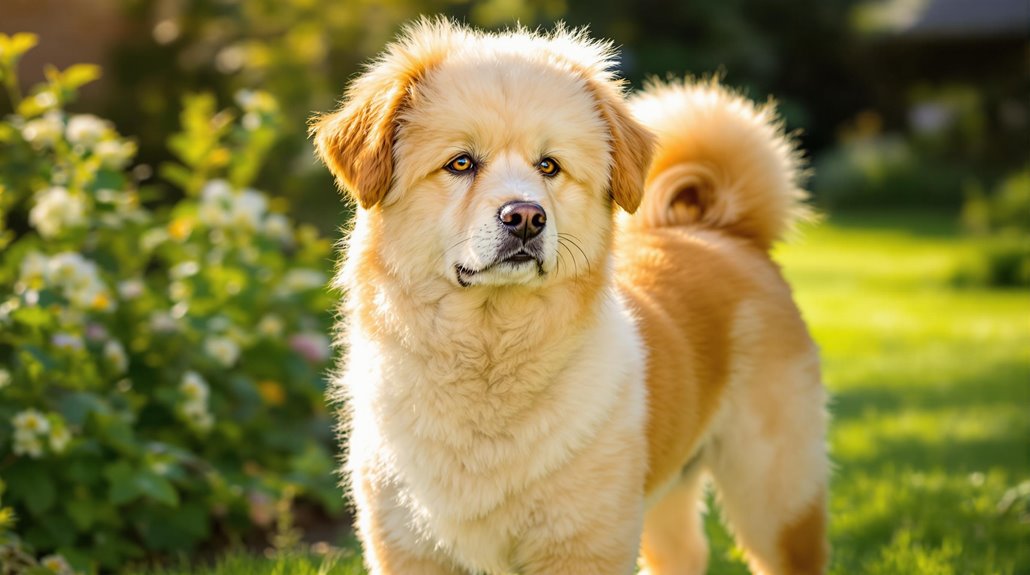
Your Aki-Poo's quick-learning abilities and problem-solving skills make them enthusiastic training partners, especially when you establish consistent routines with daily hour-long walks. You'll notice their loyalty shine through in how naturally they bond with toddlers, often becoming gentle protectors while maintaining their characteristic independence. Their balanced nature means they'll happily join family activities but won't hesitate to entertain themselves when you're busy, making them adaptable companions for various household dynamics.
Quick-Learning Problem Solvers
Through their distinctive blend of Akita loyalty and Poodle intelligence, Aki-Poos stand out as remarkable problem solvers in the designer dog world. You'll find their quick-learning abilities shine through during training sessions, where they often surpass other breeds in command comprehension and execution.
These intelligent hybrids excel at mastering new skills, thanks to their Poodle heritage. You can expect your Aki-Poo to:
- Grasp new commands with minimal repetition
- Adapt quickly to different training methods
- Show exceptional problem-solving capabilities during interactive games
To maximize your Aki-Poo's potential, you'll need to:
- Provide consistent mental stimulation through puzzles and training exercises
- Balance their enthusiasm to please with their independent nature
- Implement early socialization to channel their intelligence positively
Remember that while these dogs are naturally gifted learners, they require structured guidance to prevent their problem-solving skills from turning into unwanted behaviors. You'll achieve the best results by combining regular training sessions with mentally stimulating activities, ensuring your Aki-Poo remains engaged and well-behaved. Their intelligence makes them especially responsive to positive reinforcement techniques.
Bonds Strongly With Toddlers
While Aki-Poos display their independent nature, they form remarkably strong bonds with toddlers when properly socialized from puppyhood. You'll find these intelligent dogs excel at creating meaningful connections with young children through playful interactions and gentle companionship.
Early socialization plays an essential role in developing your Aki-Poo's relationship with toddlers. You'll need to:
- Introduce your puppy to children gradually and positively
- Establish clear boundaries for both dog and child
- Reward gentle interactions consistently
- Monitor playtime to guarantee safety
Your Aki-Poo's protective instincts may initially make them cautious around unfamiliar situations, but with proper training, they'll become reliable companions for your little ones. You can strengthen these bonds by:
- Engaging in supervised play sessions
- Teaching basic commands that promote gentle behavior
- Creating positive associations with child interactions
- Maintaining consistent routines
While their independent streak might occasionally surface, you'll find that Aki-Poos respond well to patient guidance. Through positive reinforcement and consistent training, you can help your Aki-Poo develop into a trustworthy, affectionate companion who respects your toddler's space while maintaining their protective nature.
Loves Hour-Long Daily Walks
On daily walks, Aki-Poos showcase their unique blend of loyalty and independence, requiring at least an hour of outdoor exercise to stay mentally and physically balanced. You'll notice their strong desire to explore during these outings, making consistent leash training essential for a controlled walking experience.
These daily walks serve multiple purposes for your Aki-Poo:
- Physical activity: Regular exercise prevents boredom and destructive behaviors that can emerge from pent-up energy
- Mental stimulation: New routes and environments help satisfy their curious nature
- Bonding time: Hour-long walks strengthen your connection with your pet
- Socialization: Exposure to different people helps manage their natural wariness of strangers
To make the most of your walks:
- Maintain a consistent schedule
- Mix up your routes to keep them engaged
- Use proper leash techniques to manage their independent spirit
- Allow supervised exploration in safe areas
- Include training exercises during walks
Remember that an Aki-Poo's exercise needs stem from both their Akita and Poodle heritage, making daily walks an essential part of their care routine.
Hip Dysplasia Screening Essential
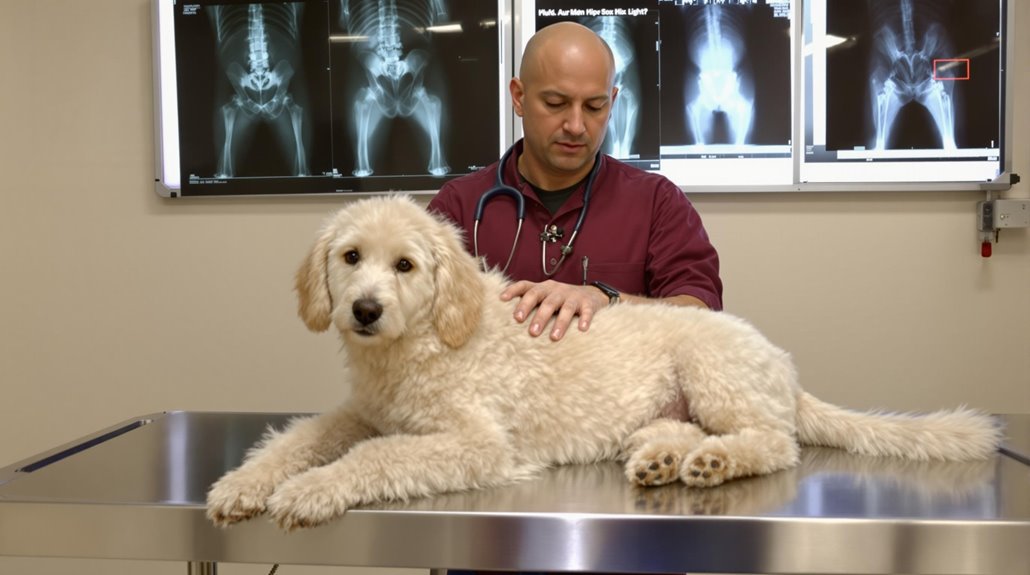
Your Aki-Poo's health monitoring needs to include regular screenings for hip dysplasia along with checks for heart valve defects that can affect this mixed breed. You'll find their lifespan typically ranges from newborn to 13 years when proper medical care, including monthly flea and tick prevention, is maintained. To protect your pet's joints and overall wellness, it's essential to work with your vet on establishing a thorough screening schedule that catches potential issues early.
Heart Valve Defect Risks
Like many designer breeds, Aki-Poos can inherit potentially serious heart valve defects from their Akita and Poodle parents. These health problems require your close attention and proactive care to guarantee your dog maintains a good quality of life. Regular veterinary check-ups are essential for monitoring your Aki-Poo's heart health and catching any issues early.
Early detection of heart valve defects greatly improves your pet's treatment options and long-term prognosis. You'll want to establish a consistent schedule of health screenings with your veterinarian, who can monitor your dog's heart function and recommend appropriate interventions when needed.
To support your Aki-Poo's heart health, you should:
- Maintain a healthy weight through proper diet
- Provide regular, appropriate exercise
- Schedule routine health screenings
- Monitor for signs of heart issues
- Follow your vet's recommended treatment plan
If you're considering adding an Aki-Poo to your family, it's important to work with a reputable breeder who conducts thorough health screenings on parent dogs. This step helps reduce the risk of inherited heart conditions and guarantees you're better prepared to meet your pet's health needs.
0-13 Years Average Lifespan
While heart health concerns deserve attention, understanding an Aki-Poo's expected lifespan and potential hip issues proves just as important. You'll find that the average lifespan of an Aki-Poo typically ranges from 12 to 15 years with proper care and management.
However, it's essential to understand that hip dysplasia can greatly impact your Aki-Poo's quality of life and longevity. This inherited condition, common in Akita lineage, requires early detection through regular veterinary screenings. You'll want to schedule these check-ups consistently to monitor your dog's joint health.
To maximize your Aki-Poo's lifespan and minimize hip problems:
- Maintain regular veterinary screenings
- Choose breeders who conduct health tests on parent breeds
- Monitor your dog's weight through proper nutrition
- Provide appropriate exercise without overexertion
- Consider joint supplements as recommended by your vet
The reported three-year average lifespan is considerably inaccurate, as properly cared-for Aki-Poos typically live four to five times longer. With proactive health management and early hip dysplasia screening, you can help guarantee your Aki-Poo enjoys a full, active life well into their senior years.
Monthly Flea/Tick Treatments Necessary
An Aki-Poo's health protection starts with monthly flea and tick treatments, which prove essential in preventing potentially serious parasitic infections. You'll need to work closely with your veterinarian to select the right preventative flea and tick medications that match your dog's specific size and health requirements.
Regular monthly treatments offer multiple benefits for your Aki-Poo:
- Prevention of skin infections and Lyme disease
- Protection for other pets in your household
- Safeguarding of family members from parasite transmission
Beyond flea and tick prevention, your Aki-Poo needs screening for hip dysplasia, a common concern in this mixed breed. Since both Akitas and Poodles can pass this condition to their offspring, you'll want to schedule hip screenings by age two. Early detection allows for proper management and treatment options.
Key Prevention Steps:
- Maintain consistent monthly flea/tick treatment schedule
- Document any adverse reactions to medications
- Schedule regular vet check-ups to monitor treatment effectiveness
- Don't skip doses, even during winter months
- Store medications safely and set reminders for treatment dates
Following these preventive measures helps guarantee your Aki-Poo stays healthy and active throughout their life.
Weekly Nail Trimming Required
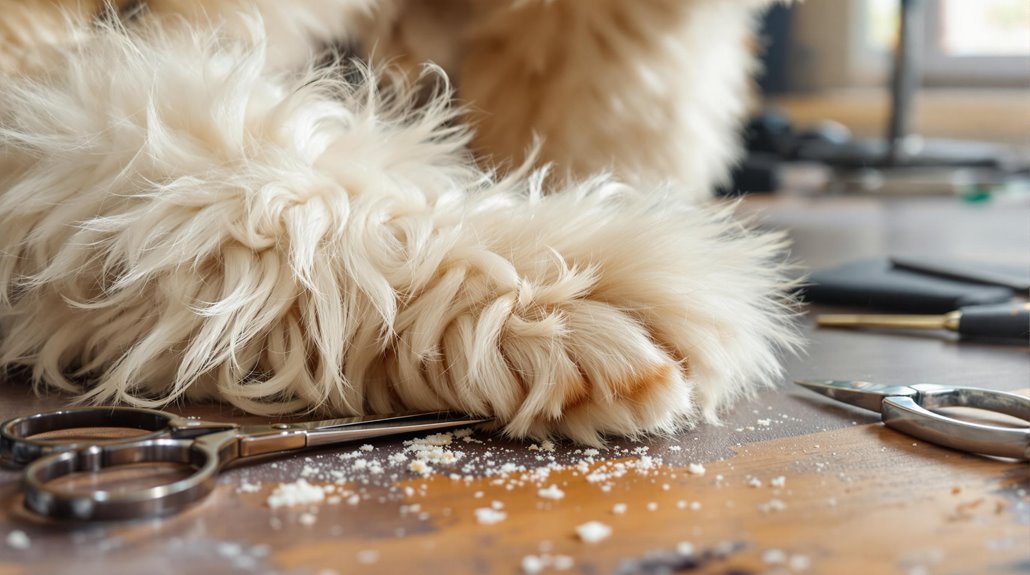
Because Aki-Poos inherit their nail growth patterns from both parent breeds, they need weekly nail trimming to maintain ideal paw health. You'll find that establishing a routine from a young age helps your dog become comfortable with the grooming process, reducing stress for both of you.
To guarantee successful nail maintenance for your Aki-Poo, follow these essential steps:
- Use proper tools, such as dog-specific nail clippers or a grinding tool designed for pet nails
- Trim small amounts at a time to avoid cutting the quick, which can cause bleeding
- Reward your dog with treats and praise during and after trimming sessions
Your Aki-Poo's activity level may affect how frequently you'll need to trim their nails. While weekly trimming is recommended, active dogs who frequently walk on concrete or rough surfaces might naturally wear down their nails more quickly. However, you shouldn't skip regular checks, as overgrown nails can lead to serious issues like toe splaying and joint problems. By maintaining consistent nail care, you're helping prevent discomfort and potential health complications that could affect your dog's quality of life.
Annual Veterinary Costs Exceed $1,200
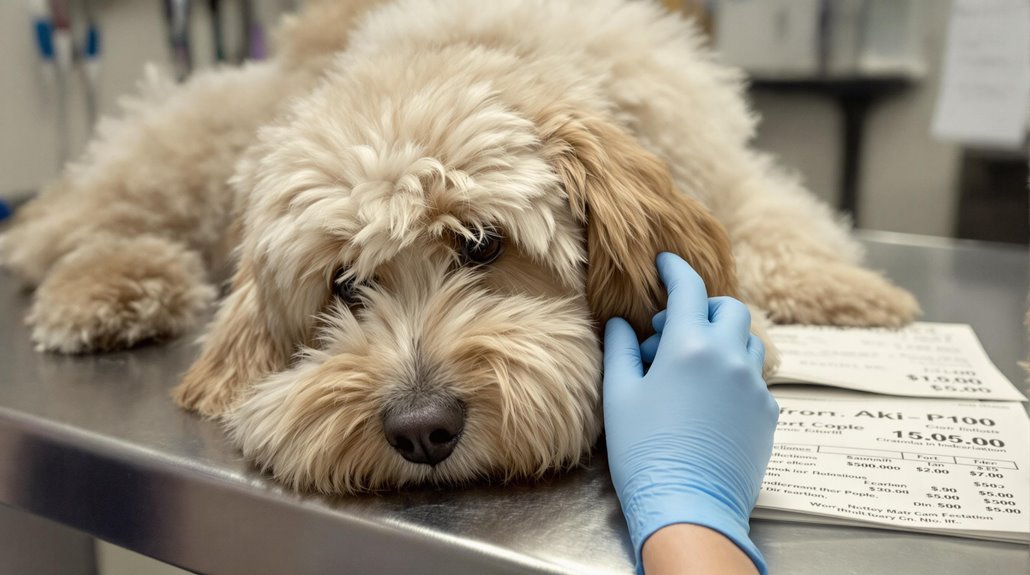
Since owning an Aki-Poo requires significant financial planning, you'll need to budget at least $1,200 annually for veterinary care. This investment helps protect your companion from common health issues like hip dysplasia and bloat, which can develop throughout their lifetime.
| Veterinary Service | Frequency | Approximate Cost |
|---|---|---|
| Routine Check-ups | Bi-annual | $300-400 |
| Vaccinations | Annual | $200-250 |
| Dental Care | Annual | $400-500 |
You'll find that preventative care forms a substantial portion of your annual veterinary costs. Regular screenings become essential due to the mixed-breed nature of Aki-Poos, which can inherit various health conditions from both parent breeds. To manage these expenses effectively, you should consider:
- Investing in extensive pet insurance coverage
- Scheduling regular preventative care appointments
- Maintaining a dedicated emergency fund for unexpected health issues
While these costs may seem substantial, they're necessary to guarantee your Aki-Poo maintains peak health. Many veterinary clinics offer wellness plans that can help you spread these expenses throughout the year, making it easier to provide consistent care for your mixed-breed companion.
Interview Multiple Breed Experts
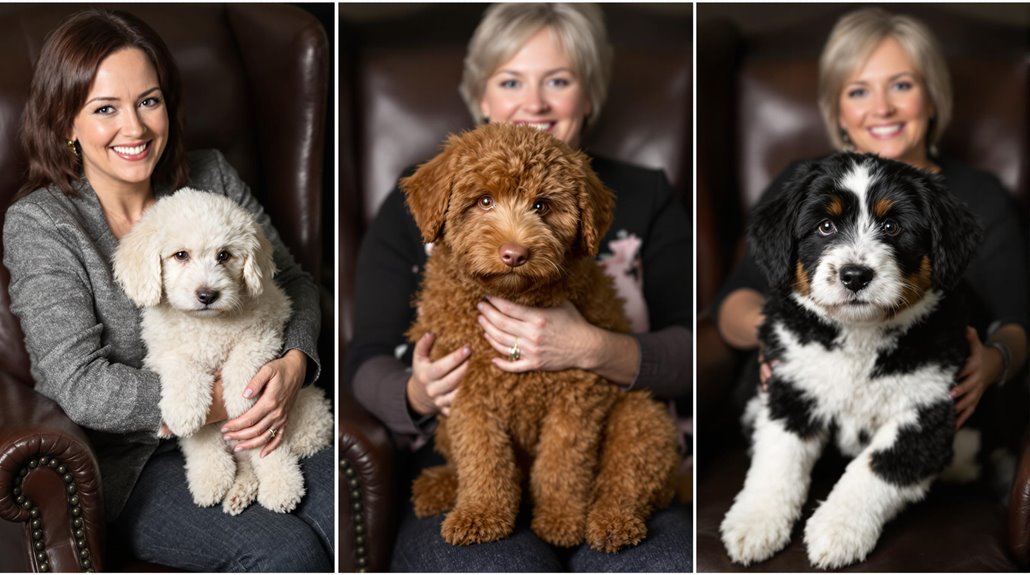
Before choosing an Aki-Poo, you'll need to interview multiple breed experts to understand the unique characteristics of this Akita-Poodle mix. When speaking with breeders and veterinarians, focus on these key areas:
Key Questions for Experts:
- Ask about the specific hybrid vigor benefits that Aki-Poos may have compared to purebred parents
- Discuss recommended early socialization techniques for this particular mix
- Learn about the range of coat types and maintenance requirements
- Inquire about temperament variations you might expect
Expert interviews will help you understand:
- How the protective Akita traits blend with the Poodle's intelligence
- Why consistent training methods work best for this mix
- What health screenings to request from breeders
- How to identify reputable breeders who prioritize genetic diversity
You'll want to speak with at least three different experts who have extensive experience with Aki-Poos. Their combined insights will give you a well-rounded understanding of what to expect from this unique hybrid. Remember to ask for specific examples of successful training approaches and socialization strategies they've observed in Aki-Poos they've worked with.
Joint Pain Symptoms FAQs
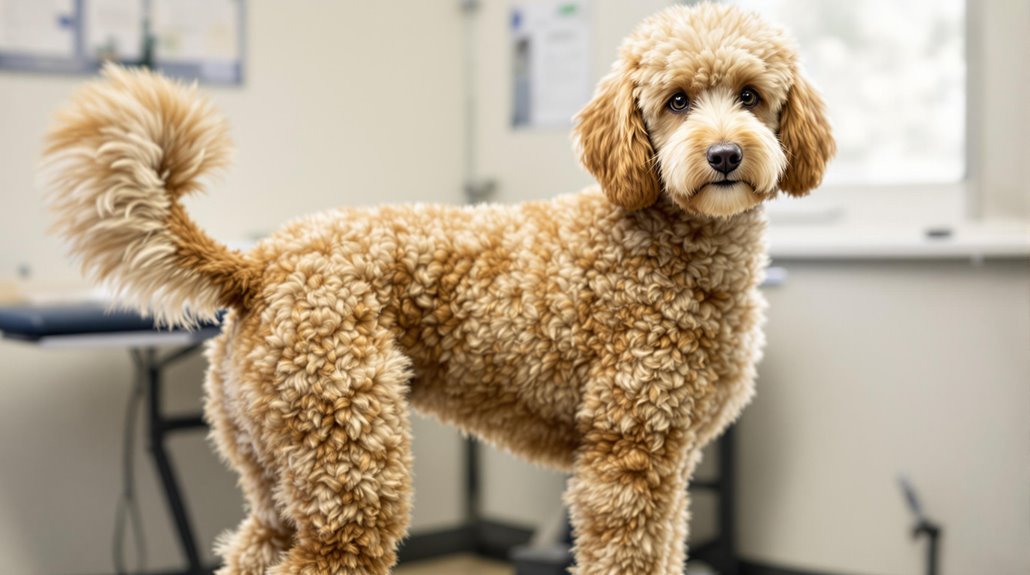
Pet owners frequently ask about joint pain symptoms in Aki-Poos, as these hybrid dogs can inherit predispositions to joint issues from both parent breeds. You'll need to watch for key signs that can help you identify potential problems early and get proper veterinary care.
Common symptoms you should monitor include:
- Limping or favoring certain legs
- Difficulty getting up after resting
- Reluctance to jump, play, or exercise
- Popping or cracking sounds during movement
- Stiffness, especially in the morning
To help your dog maintain healthy joints:
- Schedule regular veterinary check-ups for early detection
- Maintain a healthy weight through proper diet
- Provide regular exercise that's appropriate for their condition
- Watch for signs of bloat, which can cause secondary joint pain
- Consider joint-friendly activities like swimming
If you notice any changes in your Aki-Poo's movement or behavior, don't wait to consult your veterinarian. Early intervention can make a significant difference in managing joint issues and maintaining your dog's quality of life. Remember that prevention through proper weight management and appropriate exercise is often more effective than treating established problems.
Frequently Asked Questions
What Is the Temperament of the Akipoo Dog?
Your Aki-Poo will display a blend of distinctive traits that make them wonderful companions. Their Aki Poo characteristics include loyalty, intelligence, and protectiveness. You'll need focused Aki Poo training due to their occasional stubbornness, though they respond well to positive reinforcement. Early Aki Poo socialization is essential, as they can be reserved with strangers. They're affectionate with family, combining the Akita's devotion and the Poodle's playful nature in one unique package.
What Is the Most Sought After Poodle Mix?
Like a golden ray of sunshine wrapped in a teddy bear's coat, the Goldendoodle stands as today's most sought-after Poodle mix. You'll find this designer dog trend dominating the hybrid breed scene, thanks to its winning combination of the Golden Retriever's friendly nature and the Poodle's intelligence. When you're looking at Poodle mix popularity, you can't overlook the Goldendoodle's hypoallergenic coat, adaptable size options, and family-friendly temperament that make it a perfect companion.
What Is an Akita Dog Mixed With a Poodle?
An Akita mixed with a Poodle creates what's known as an Aki-Poo. You'll find these dogs combine the Akita's protective nature with the Poodle heritage of intelligence. Their Aki-Poo characteristics include a size range of 15-28 inches tall and weight between 45-120 pounds. When it comes to Akita grooming needs, they'll vary based on which parent's coat type they inherit, but you can expect regular maintenance to keep their fur healthy and manageable.
What Is the Best Breed to Mix With an Akita?
When choosing the best breed to mix with an Akita, you'll find that Poodles, German Shepherds, and Golden Retrievers offer excellent compatibility. Poodles can enhance your mix with intelligence and hypoallergenic traits, while German Shepherds contribute trainability and protective instincts. If you're seeking a more family-friendly companion, Golden Retrievers help balance the Akita's assertive characteristics with gentle playfulness. Each mix provides unique benefits, but remember that individual puppies can inherit varied traits.
Conclusion
Like Dr. Frankenstein's creation, you'll find the Aki-poo is a unique designer breed that combines the best traits of its parent breeds. While other Akita mixes exist, you won't find another crossbreed that matches the Aki-poo's distinctive blend of intelligence, loyalty, and adaptability. They're not just another designer dog – they're a remarkable example of how selective breeding can create a companion that's both physically impressive and temperamentally balanced.
